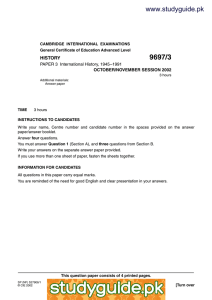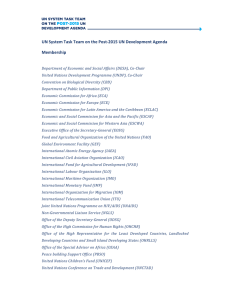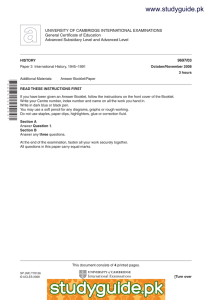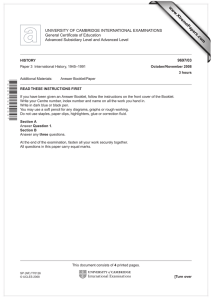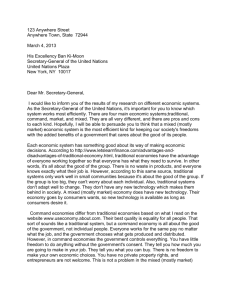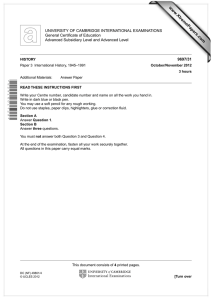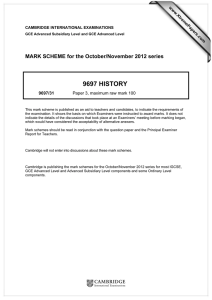9697/3 HISTORY PAPER 3 International History, 1945–1991 www.XtremePapers.com
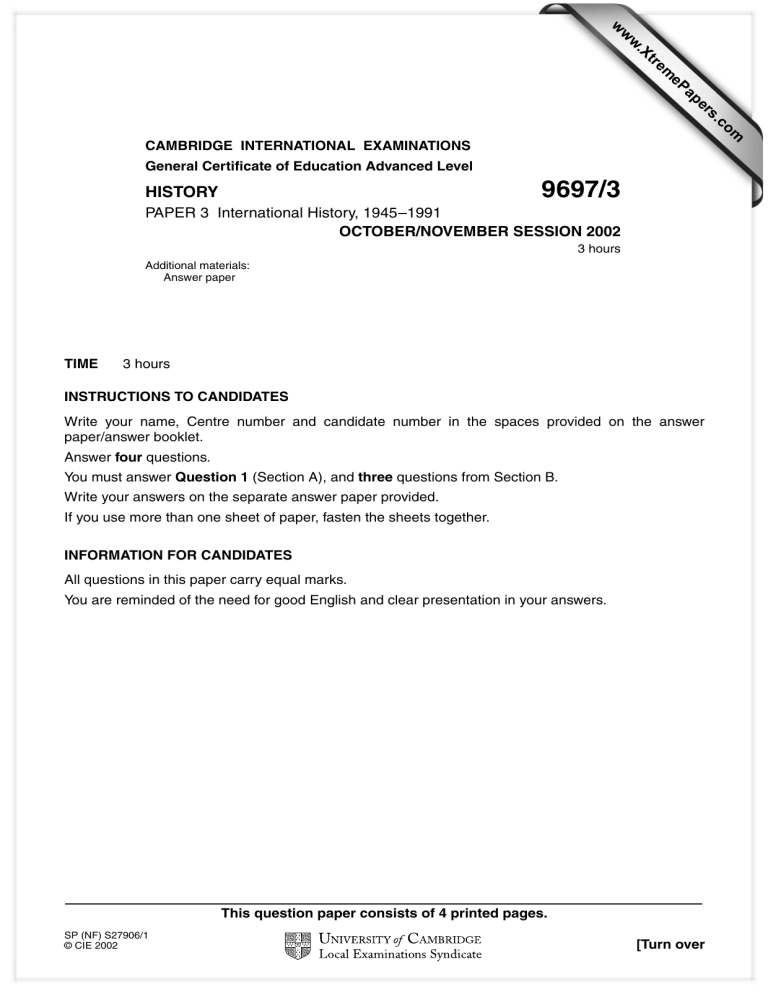
www.XtremePapers.com
CAMBRIDGE INTERNATIONAL EXAMINATIONS
General Certificate of Education Advanced Level
HISTORY
9697/3
PAPER 3 International History, 1945–1991
OCTOBER/NOVEMBER SESSION 2002
3 hours
Additional materials:
Answer paper
TIME 3 hours
INSTRUCTIONS TO CANDIDATES
Write your name, Centre number and candidate number in the spaces provided on the answer paper/answer booklet.
Answer four questions.
You must answer Question 1 (Section A), and three questions from Section B.
Write your answers on the separate answer paper provided.
If you use more than one sheet of paper, fasten the sheets together.
INFORMATION FOR CANDIDATES
All questions in this paper carry equal marks.
You are reminded of the need for good English and clear presentation in your answers.
SP (NF) S27906/1
© CIE 2002
This question paper consists of 4 printed pages.
[Turn over
2
Section A
You must answer Question 1.
THE CHANGING POSITION OF THE UN SECRETARY-GENERAL
1 Read the sources and then answer the question.
Source A
It must be recalled that Trygve Lie had to operate in a UN which was still very much an ‘East-West’ structure. The ‘third world’ of new nations, which was later to strengthen Hammarskjold was then only emerging. And he had to begin by building on foundations of authority which were scarcely visible.
The enlargement of the role of the Secretary-General was fervently backed at its very start in 1946 by none other than Andrei Gromyko, now Soviet Foreign Minister. Gromyko cited Article 99 to buttress
Lie’s claim and declared that ‘the Secretary-General has all the more right, and an even greater obligation, to make statements on various questions considered by the Security Council’.
Perspective suggests that it was a fortunate chance in 1946 that Lie – largely because of his position on the Iran question – was rather doubtfully regarded in Washington and that he was much less suspect in Moscow.
Andrew Boyd, British journalist, in his book, ‘United Nations: Piety, Myth and Truth’, 1962 .
Source B
Although the Congo operation would probably have foundered without the dynamism, skill and political courage of Hammarskjold, his successors absorbed the lesson that, in the long term, the Secretary-
General needs the minimal support from all the permanent members and all the major geographical groups in order to carry out the duties of his office adequately. The chances are that, if Hammarskjold had not died in 1961, the Soviet boycott would have accomplished his political death, as it did with
Trygve Lie. His three successors in the Cold War years – U Thant, Waldheim and Perez de Cuellar – went out of their way, too far in my judgement, to avoid giving offence to major UN players, in particular the two superpowers.
Anthony Parsons, British ambassador to the United Nations, in his book
‘From Cold War to Hot Peace: UN Interventions 1947–1995’, 1995 .
9697/3/O/N/02
3
Source C
The spectacle of a great power opposing a Secretary-General of whom a majority of the UN members approve is not new. The Soviet Union did it with Trygve Lie and with Dag Hammarskjold, who did more than anyone else to make the UN, and the office of Secretary-General, active agencies for mediation and peacekeeping. The Soviet Union resented Hammarskjold’s view that the Secretary-General should act according to his best judgement, especially in dangerous situations.
The Eisenhower administration had its disagreements with Hammarskjold over US attempts to bring down the regime in Guatemala, among other matters, but it concluded that a strong and independent
Secretary-General was, on balance, in the best interests of the United States.
Brian Urquhart, leading UN diplomat 1945–86, writing in an American journal, 1999 .
Source D
By the time Perez de Cuellar became Secretary-General, his predecessors had created for themselves a dispute-settlement role separate and often different from the expressed policy of some, or even most of the members of the United Nations. By the mid-1980s there could be little doubt that the only important winner in the intra-institutional power struggle had been the Secretary-General. The General
Assembly could make more noise, the Security Council could act more decisively, if ever there was unanimity among permanent members. But to the limited extent that the UN was having any positive effect on the real world beyond its own compound, it was primarily because of the functions performed by the Secretary-General.
Thomas Franck and George Nolte, American and German law professors, on the role of the
Secretary-General, 1988 .
Source E
The only Secretary-General really to have measured up to the great potential of the job was Dag
Hammarskjold. His successors never came near to his stature. One historian of the United Nations has sharply observed: ‘U Thant was invisible: Kurt Waldheim was a liar: Perez de Cuellar was a man of whom the US ambassador to the UN, Vernon Walters, once said “he couldn’t make waves if he fell out of a boat”.’
William Shawcross, British journalist, writing in his book, ‘Deliver us from Evil: Warlords and
Peacekeepers in a World of Endless Conflict’, 2000 .
Now answer the following question.
‘The UN Secretary-General has never possessed any independent power.’ How far do Sources A–E support this view of the position of the Secretary-General in the period 1945–1991?
9697/3/O/N/02
[Turn over
4
Section B
You must answer three questions from this section.
You must not answer both Question 3 and Question 4.
2 How far has the historical debate about the origins of the Cold War changed since the collapse of the USSR in 1991?
3 ‘The globalisation of the Cold War in the 1950s and 1960s is clear evidence that both the USA and the USSR had expansionist ambitions.’ Discuss.
OR
4 Analyse the impact of the Cuban revolution on American policy towards Cuba in the period to
1962.
5 Compare and contrast the crisis experienced by China in the late 1980s with that experienced by the USSR under Gorbachev.
6 Account for the evolution of American nuclear deterrence strategy from massive retaliation (1954) to assured destruction (1964) and flexible response (agreed by NATO in 1967).
7 Assess the contribution of the US to the development of the international economy in the period
1945–80.
8 How far do you agree that, in the vast majority of cases, decolonisation gave the appearance but not the reality of independence?
9697/3/O/N/02
